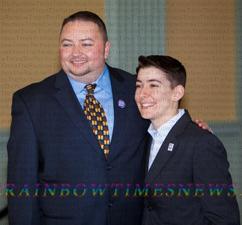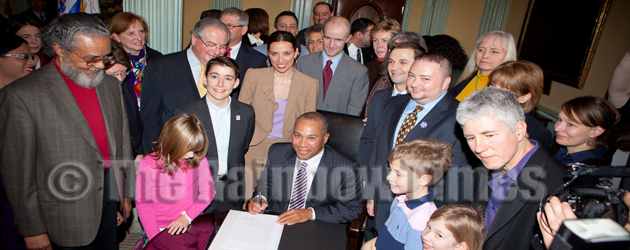
Gunner Scott, MTPC (left) and Kara Suffredini (right) at the Transgender Bill Signing ceremony. Credit: Glenn Koetzner/TRT Photographer
By: Chuck Colbert/TRT Reporter/
BOSTON, Mass. — Remarks during the signing ceremony for Massachusetts’ new transgender civil-rights law lasted less than an hour when, on Thursday, Jan. 19, activists, lawmakers, the governor, and state constitutional officers gathered before noon on Beacon Hill in the Senate Reading Room. There, in the old Senate chamber, several hundred joyful and grateful people marked an occasion some were not quite sure they would ever celebrate.
Six years ago, “We honestly wondered and worried if anyone would show up to testify,” explained state Rep. Carl M. Sciortino, Jr. (D-Medford).
Sciortino, a lead House sponsor of the transgender bill, was referring to the first time lawmakers considered a measure that would extend basic civil-rights and hate-crimes protections to an estimated 30,000 transgender residents of the Commonwealth.
“It was telling that day [of testimony in the Gardener Auditorium],” he said, “when people told us, ‘Can I go into that building [the State House]? Can I get through security?”’
Many transgender people, their families, friends and allies in fact did show up then and over the years to testify and lobby lawmakers, sharing painful personal stories of discrimination and violence against them. In the end, story telling made all the difference.
“It has not been an easy ride,” Sciortino said, “with many bumps along the way, in so many years of fighting, many false starts and roller-coaster rides.”
Nonetheless,” welcome to the people’s house,” he said.
“This is what comes from turning to each other rather than turning against each other,” said Gov. Deval Patrick, whom Sciortino introduced as a “hero and legend of LGBT equality.”
“This is about what happens when people come together for common cause for their own sake and for the sake of a principle, which is that people should come before their government as equals,” Patrick said.
“I am so proud of you,” he said. “And look at what you have done.”
Recent legislative background
The Massachusetts House of Representatives passed “An Act Relative to Transgender Equal Rights” by a vote of 95 – 58 on Nov. 15, 2011. The following day the Senate approved the measure on a voice vote. Gov. Patrick signed the bill into law on Nov. 23.
When it takes effect on July 1, 2012, the Commonwealth will join 15 other states and the District of Columbia in extending protections to its transgender residents in employment, housing, education, credit, and hate crimes.
Amherst, Cambridge, Boston, and Northampton already have local ordinances protecting transgender persons.
Altogether, 136 cities and counties nationwide have included “gender identity” in non-discrimination ordinances and laws.
States with transgender civil-rights protections include California, Colorado, Connecticut, Hawaii, Illinois, Maine, Minnesota, New Jersey, New Mexico, Rhode Island, Vermont, Iowa, Oregon, Washington, and Nevada.
Under current Massachusetts law, race, color, religious creed, national origin, sex, sexual orientation, age, among other categories are protected classes. The new would add the term “gender identity” to the list.
The new law defines that term as “a person’s gender-related identity, appearance or behavior, whether or not that gender-related identity, appearance or behavior is different from that traditionally associated with the person’s physiology or assigned sex at birth. Gender-related identity may be shown by providing evidence including, but not limited to, medical history, care or treatment of the gender-related identity, consistent and uniform assertion of the gender-related identity or any other evidence that the gender-related identity is sincerely held, as part of a person’s core identity; provided however, gender-related identity shall not be asserted for any improper purpose.”
In addition to Sciortino, Rep. Byron Rushing (D-South End) was a leading co-sponsor in the House, along with Senators Benjamin B. Downing (D-Pittsfield) and Sonia Chang-Diaz (D-Boston), lead co-sponsors in the Senate.
For now, public accommodations omitted
The new law, however, does not include protections for public accommodations, such as hotels and restaurants, restrooms, locker rooms, public buildings and transit, including subway and bus lines.
That omission bothers Sen. Chang-Diaz, who, in her brief remarks, referred to the law as “not perfect,” and vowing “another fight, on another day, to come back and get public accommodations.”
Those provisions were included in an earlier version of the bill but were dropped in a redrafting of the measure by the House Committee on the Judiciary, whose chairman is Rep. Eugene L. O’Flaherty (D-Chelsea).
The bill’s detractors zeroed in on fears about public safety in restrooms and locker rooms. In an effort to derail the measure, opponents derisively labeled it a “bathroom bill,” stirring up fears of sexual predators stalking public restrooms.
Attorney General Martha Coakley spoke to those concerns in her remarks. “This law enhances our responsibility to prosecute criminal behavior and to protect civil rights of all,” she said. “There is nothing to restrict our ability to prevent victims of any crime.”
Coakley said, too, that the day marked “an enormous stride in Massachusetts to be able to say we do respect people’s rights here.”
Chang-Diaz agreed. “This is a huge step forward,” she said. “It’s a great, great day.”
Meanwhile, “We have our work cut out for us,” said Arline Isaacson, chairwoman of the Massachusetts Gay and Lesbian Political Caucus, a statewide advocacy and lobbying organization.
In a short interview after the signing ceremony, Isaacson was referring to adding public-accommodations to the law.
“But there is no doubt in my mind now that it is illegal to discriminate against transgender people,” those protections will get included, she said.
Saying we’re sorry, asking forgiveness
Rep. Rushing also spoke before the governor signed the bill.
“Let me remind us of one thing,” he told the gathering. “When you come here, when anyone who has been discriminated against and deprived of their rights in our society — when you come and demand those rights, you are not demanding those rights because you don’t have them.”
“You were born with those rights,” explained Rushing. “What you come to us to do is recognize what we already should have known. What you come to government to do is to protect and acknowledge those rights.”
“That is what we are celebrating today,” Rushing said, adding, “We should not forget the time when we did not acknowledge those rights and your humanity.”
“We are incredibly sorry and ask for your forgiveness,” he said. “Transgender people were treated terribly in this state with no recourse. Now you have this law.”
Holding out hope for LGBT youth
In her remarks, Kara Suffredini, executive director of Mass Equality, a statewide advocacy organization, offered encouragement to youth.
“To young people in the Commonwealth in the process of self-discovery, today’s celebration sends a message of hope that in Massachusetts everybody should be able to be safe, open, and have authentic lives free of discrimination no matter who they are,” she said.
In securing transgender civil rights, Mass Equality flexed considerable organizational muscle, making 100,000 telephone calls to legislators and sending them 5,000 post cards in support of the measure, among other lobbying efforts, which included critically important face-to-face meetings of transgender constituents with their representatives and senators.
In closing comments, Gunner Scott, executive director of the Massachusetts Transgender Political Coalition, quoted author, philosopher, and civil rights activist Cornel West. “Never forget that justice is what love looks like in public,” said Scott.
Tearing up
Bisexual activist Robyn Ochs and others were moved to tears during the celebration. “The power of being in a room with people who have worked so hard and for so long to bring about this day,” she said, was overwhelming.
“It feels like we have turned a corner,” said Alex Coleman, a transgender man and activist. “I am so impressed with all the transgender people who are so vulnerable and who came forward and became visible to tell our stories when we are so often ostracized,” he said, adding, “It was courageous for our allies,” as well.
Logan Ferraro, a transgender man who helped with bill, also fought back tears, he said, looking over at longtime activist and LGBT community leader Grace Sterling Stowell, executive director of BAGLY, or the Boston Alliance of Gay, Lesbian, Bisexual, and Transgender Youth.
“I respect her so much,” Ferraro said. “She is someone who has made such a difference in my life.”
Added Ferraro, who transitioned during his senior year in high school, “We’ve made amazing steps in our lives. I am glad to be a part of it.”
Michelle Figuierdo, a transgender woman, said the signing ceremony was “surreal,” adding, “I am full of pride and happiness” with all the “time and effort” it took to “see us as human beings, which is who we are.”



